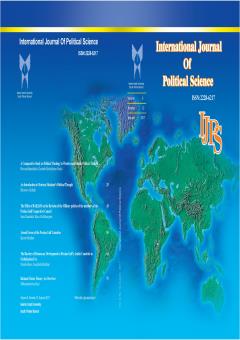Iran and the Action of Agents of the Security Environment of West Asia
Subject Areas :
Seyed Taghi Hashemi
1
,
Ebrahim Mottaghi
2
*
,
Garineh Keshishyan Siraki
3
![]()
1 - Department of Political Science, South Tehran Branch, Islamic Azad University, Tehran, Iran
2 - Department of Political Science, University of Tehran, Tehran, Iran
3 - Department of Political Science, South Tehran Branch, Islamic Azad University, Tehran, Iran & Member of the Western Studies Research Institute
Keywords: Agent-Structure, Security Environment, Iran, West Asia,
Abstract :
Southwest Asia has played a central role in the geopolitics of the global system since the Cold War years. All characteristics of a geopolitical region can be observed in Southwest Asia. In this geographical area, signs of challenge, crisis, conflict, and competition for power expansion among regional actors and significant powers are expanding. The security environment of Southwest Asia is linked with many indicators of "geopolitics of crisis" and "geopolitics of chaos." Given these conditions, as well as the political and social challenges and the geopoliti-cal conflicts and security concerns in the region, the actions of actors—especially the emer-gence of centrifugal actors in Southwest Asia—will also change. Accordingly, it is predictable that the states of Southwest Asia can achieve their goals under conditions of stability and se-curity. As a result, the national goals and interests of the Islamic Republic of Iran can also be better secured under such conditions. In other words, the agent's actions in this region influ-ence the security environment of this area. The aim of this study is to explain the actions of the agents and examine the impact of their actions on the processes of the security environ-ment. The study's findings show that one of Iran's security priorities in Southwest Asia is to prevent the increase of influence by regional and extra-regional powers in this area and reduce it. In this regard, Iran seeks to tie its interests to the region by creating economic and cultural relations that ensure mutual and multilateral benefits through appropriate and reasonable se-curity policy.
Anderson, Tim (2017), "The Dirty War on Syria; Washington's Regime Change and Resistance," translated by Mehdi Hedayati Shahidani, Rasht: Gillan University Press.
Barzegar, Keyhan (2014), "Iran's Regional Policy Over Time," Tehran: Middle East Scientific Research and Strate-gic Studies Center.
Barzegar, Keyhan (2015), "The Foreign Poli-cy of the Islamic Republic of Iran in the Middle East," Tehran: Office of Political and International Studies, Ministry of Foreign Affairs.
Barzegar, Keyhan (2018), "Iran's Foreign Policy Strategy in Regional Power Balance," Strategic Studies, Volume 21, No. 4, Winter.
Buzan, Barry (2009), "The National Security Problem in the Third World," in-cluded in Azar, Edward and Chung In Moon "National Security in the Third World," translated by the Stra-tegic Studies Research Institute, Tehran: Strategic Studies Research Institute.
Byman, Daniel and Pollack Kenneth M. (2007) Things fall apart: containing the spillover from an Iraqi civil war, Brookings Institution Press.
Cohen, Saul (2008), "Geopolitics of the Global System," translated by Abbas Kardan, Tehran: Abrar Moaser Pub-lications.
Dokmejian, Hrair (1998). "Islam in Revolu-tion: Islamic Movements in the Arab World (A Study of the Phenomenon of Islamic Fundamentalism)," trans-lated by Hamid Ahmadi, Tehran: Keyhan Publications.
Entessar, Nader and Kaveh Afrasiabi (2016), "The Marathon of Nuclear Negotia-tions from Saadabad to Coburg," translated by Seyyed Jafari and Ruhollah Faghihi, Tehran: Ghomes Publications.
Keller, Miles, Randall Henning, Chad Bow-en, Hong Ying Wang, Eric Wooten, Paul Williams (2018). "The New World Order and Regionalism," translated by Ali Sabaghian, Mahmoud Javadi, Tehran: Khorsand Publications.
Khamenei, Seyyed Ali (1997), "Guidelines on Foreign Policy," Tehran: Imam Khamenei's Works Publishing Cen-ter.
Khomeini, Ruhollah, Leader of the Revolu-tion and Founder of the Islamic Re-public of Iran (1999), "The Islamic World from Imam Khomeini's Per-spective," compiled by Ali Rastani Beiraki, Tehran: Institute for the Compilation and Publication of Imam Khomeini's Works.
Lewis, Bernard (2019), "Faith and Power; Religion and Politics in the Middle East," translated by Mohseni Dare-bidi, Tehran: Ashian Publishing.
Mosala-Nejad, Abbas (2015), "Economic Policymaking of Oil and Interna-tional Sanctions on Iran," Political Science Research Journal, Volume 10, No. 3, Summer 2015, pp. 171-201.
Sambanis Nicholas (2004). What Is Civil War? Conceptual and Empirical Complexities of an Operational Def-inition, The Journal of Conflict Res-olution, Vol. 48, No. 6 (Dec., 2004), pp. 814-858 (45 pages).
Schultz, Derek, Erik Erdmann, Martin In-dyk, Robert Kagan, and Thomas Wright (2017), "Creating Power Po-sitions in U.S. National Security Strategy," translated by the General Research Office, Tehran: Fars News Agency Publishing.
Touraine, Alain (2017). "The New Para-digm," translated by Salman Sadeghi Zadeh, Tehran, Scientific and Cul-tural Publishing Company (Islamic Revolution Education).
Welsh Jennifer M. (1993). A Peoples' Eu-rope? European Citizenship and Eu-ropean Identity, politics, Volume 13, Issue 2, pp 25-31.
Zakaria, Fareed (2020). "The Post-American World," translated by Ahmad Azizi, Tehran, Hermes Publications.

